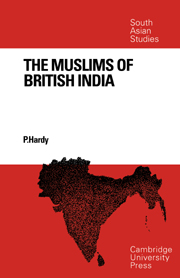Book contents
- Frontmatter
- Contents
- A note on spelling
- Acknowledgements
- 1 Introduction: the medieval legacy
- 2 The effects of British rule on Muslims before 1857
- 3 1857 and its aftermath
- 4 Muslims come to terms with British India as Muslims
- 5 Muslims move towards political community 1871–1901
- 6 Muslims acquire a constitutional identity and enter all-India politics
- 7 Religion enters politics 1910–24
- 8 The period of frustration 1924–35
- 9 The two partitions: of British India and of the Muslim community
- Maps
- A descriptive bibliography of works in European languages
- Glossary
- Index
2 - The effects of British rule on Muslims before 1857
Published online by Cambridge University Press: 19 October 2009
- Frontmatter
- Contents
- A note on spelling
- Acknowledgements
- 1 Introduction: the medieval legacy
- 2 The effects of British rule on Muslims before 1857
- 3 1857 and its aftermath
- 4 Muslims come to terms with British India as Muslims
- 5 Muslims move towards political community 1871–1901
- 6 Muslims acquire a constitutional identity and enter all-India politics
- 7 Religion enters politics 1910–24
- 8 The period of frustration 1924–35
- 9 The two partitions: of British India and of the Muslim community
- Maps
- A descriptive bibliography of works in European languages
- Glossary
- Index
Summary
Writing in 1871, the Bengal civilian, W. W. Hunter (1840–1900), described ‘the Musalmans’ as ‘in all respects…a race ruined under British rule’. Ignoring his caveat that his remarks applied only to lower Bengal, most historians have not only accepted his judgement as valid for that region but have also extended it to depict the fate of Muslims throughout British India. Certainly British rule ruined the office-holding Muslim aristocrat of lower Bengal, but not all at once. British rule, or rather British manufactures, also ruined the Muslim weaver of Dacca, but not all at once. For other Muslims, in the Panjab for example, British rule brought security; for some in Bombay who were engaged in shipping it brought wealth; for some in British service in the North-Western Provinces, the centre of Mughal culture, it brought more land. The only generalisation possible is that gradually the British changed the form and style of success in Indian society from the military to the commercial. In so far as Muslims were left by the decline of the Mughal empire in a position to become capitalists, they could prosper just as non-Muslims could prosper.
THE EAST INDIA COMPANY, THE MUGHAL DYNASTY AND THE MUSLIM OFFICE-HOLDING CLASSES
For the many Muslims who wanted to preserve their illusions, the establishment of British supremacy in India wrought changes more real than apparent. Looking back over the period after the death of Aurangzib, the Mughal aristocracy could see that they had shared power to their increasing disadvantage with plebians – Marathas, Jats and indeed Afghan adventurers.
- Type
- Chapter
- Information
- The Muslims of British India , pp. 31 - 60Publisher: Cambridge University PressPrint publication year: 1972
- 1
- Cited by



